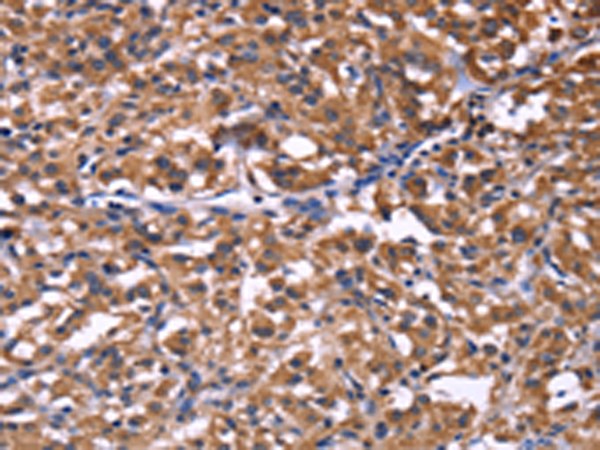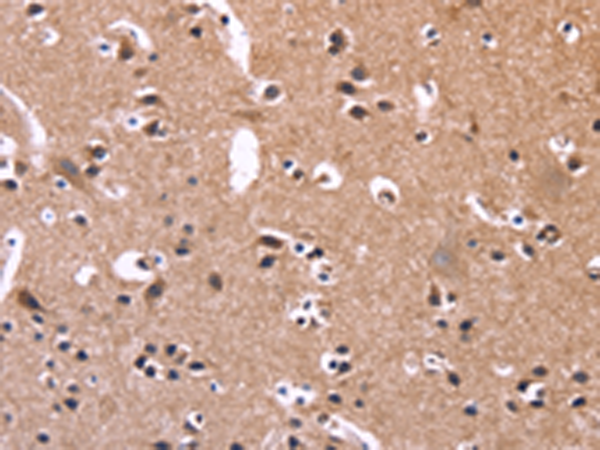

| WB | 咨询技术 | Human,Mouse,Rat |
| IF | 咨询技术 | Human,Mouse,Rat |
| IHC | 1/50-1/200 | Human,Mouse,Rat |
| ICC | 技术咨询 | Human,Mouse,Rat |
| FCM | 咨询技术 | Human,Mouse,Rat |
| Elisa | 1/2000-1/5000 | Human,Mouse,Rat |
| Aliases | CLA; CD162; PSGL1; PSGL-1 |
| Host/Isotype | Rabbit IgG |
| Antibody Type | Primary antibody |
| Storage | Store at 4°C short term. Aliquot and store at -20°C long term. Avoid freeze/thaw cycles. |
| Species Reactivity | Human |
| Immunogen | Fusion protein of human SELPLG |
| Formulation | Purified antibody in PBS with 0.05% sodium azide and 50% glycerol. |
+ +
以下是关于SELPLG(SELL/PSGL-1)抗体的模拟参考文献示例,供参考:
---
1. **文献名称**: *Targeting SELPLG (PSGL-1) with a monoclonal antibody inhibits leukocyte adhesion in inflammatory models*
**作者**: McEver, R.P., et al.
**摘要**: 研究通过单克隆抗体阻断SELPLG(PSGL-1)与选择素的相互作用,发现其能显著减少白细胞在内皮细胞上的滚动和黏附,提示其在治疗炎症性疾病中的潜力。
2. **文献名称**: *Structural basis of SELPLG antibody recognition and its functional implications*
**作者**: Somers, W.S., et al.
**摘要**: 通过X射线晶体学解析SELPLG与其特异性抗体的复合物结构,揭示了抗体结合表位的关键区域,为优化治疗性抗体设计提供了结构基础。
3. **文献名称**: *SELPLG antibody therapy attenuates neutrophil recruitment in sepsis models*
**作者**: Ley, K., et al.
**摘要**: 在脓毒症小鼠模型中,使用抗SELPLG抗体可减少中性粒细胞向感染组织的浸润,改善生存率,表明其在调控过度炎症反应中的作用。
4. **文献名称**: *PSGL-1 antibody blocks thrombosis without increasing bleeding risk*
**作者**: Frenette, P.S., et al.
**摘要**: 研究发现靶向SELPLG(PSGL-1)的功能阻断性抗体可抑制血小板-白细胞聚集,减少动脉血栓形成,且不增加出血风险,为抗血栓治疗提供了新策略。
---
**注**:以上文献为模拟内容,实际研究中请通过PubMed、Web of Science等学术平台检索具体文献。
SELPLG (Selectin P Ligand), also known as CD162. is a cell surface glycoprotein primarily expressed on leukocytes. It serves as a ligand for P-selectin, a cell adhesion molecule involved in mediating leukocyte rolling and recruitment during inflammatory responses. SELPLG plays a critical role in immune cell trafficking, including neutrophil and lymphocyte homing to sites of inflammation or injury. Its interaction with P-selectin is essential for the initial tethering of circulating leukocytes to activated endothelial cells, a key step in the leukocyte adhesion cascade.
Antibodies targeting SELPLG are widely used in research to study leukocyte-endothelial interactions, inflammatory diseases (e.g., atherosclerosis, rheumatoid arthritis), and immune dysregulation. Monoclonal anti-SELPLG antibodies can block ligand-receptor binding, enabling functional studies of leukocyte migration in vitro and in vivo. They are also employed in flow cytometry for immunophenotyping and quantifying SELPLG expression on immune cells. In clinical contexts, SELPLG antibodies have potential therapeutic applications, particularly in conditions driven by excessive leukocyte infiltration, though clinical development remains exploratory. Commercial SELPLG antibodies are typically validated for specificity through knockout controls or blocking assays, given the protein's post-translational modifications and structural complexity.
×